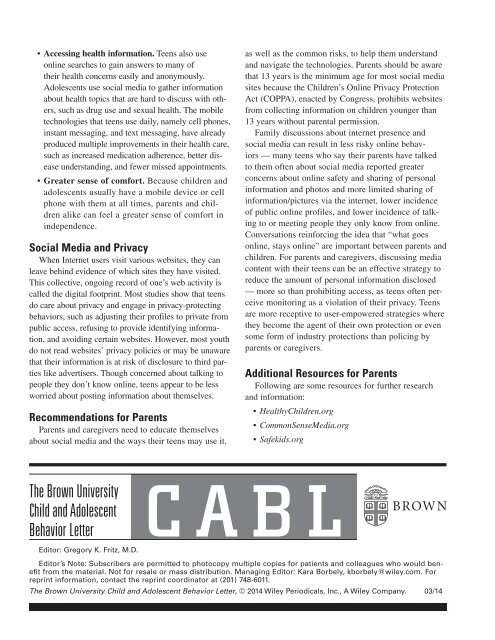A Guide for Parents
Create successful ePaper yourself
Turn your PDF publications into a flip-book with our unique Google optimized e-Paper software.
• Accessing health in<strong>for</strong>mation. Teens also use<br />
online searches to gain answers to many of<br />
their health concerns easily and anonymously.<br />
Adolescents use social media to gather in<strong>for</strong>mation<br />
about health topics that are hard to discuss with others,<br />
such as drug use and sexual health. The mobile<br />
technologies that teens use daily, namely cell phones,<br />
instant messaging, and text messaging, have already<br />
produced multiple improvements in their health care,<br />
such as increased medication adherence, better disease<br />
understanding, and fewer missed appointments.<br />
• Greater sense of com<strong>for</strong>t. Because children and<br />
adolescents usually have a mobile device or cell<br />
phone with them at all times, parents and children<br />
alike can feel a greater sense of com<strong>for</strong>t in<br />
independence.<br />
Social Media and Privacy<br />
When Internet users visit various websites, they can<br />
leave behind evidence of which sites they have visited.<br />
This collective, ongoing record of one’s web activity is<br />
called the digital footprint. Most studies show that teens<br />
do care about privacy and engage in privacy-protecting<br />
behaviors, such as adjusting their profiles to private from<br />
public access, refusing to provide identifying in<strong>for</strong>mation,<br />
and avoiding certain websites. However, most youth<br />
do not read websites’ privacy policies or may be unaware<br />
that their in<strong>for</strong>mation is at risk of disclosure to third parties<br />
like advertisers. Though concerned about talking to<br />
people they don’t know online, teens appear to be less<br />
worried about posting in<strong>for</strong>mation about themselves.<br />
Recommendations <strong>for</strong> <strong>Parents</strong><br />
<strong>Parents</strong> and caregivers need to educate themselves<br />
about social media and the ways their teens may use it,<br />
as well as the common risks, to help them understand<br />
and navigate the technologies. <strong>Parents</strong> should be aware<br />
that 13 years is the minimum age <strong>for</strong> most social media<br />
sites because the Children’s Online Privacy Protection<br />
Act (COPPA), enacted by Congress, prohibits websites<br />
from collecting in<strong>for</strong>mation on children younger than<br />
13 years without parental permission.<br />
Family discussions about internet presence and<br />
social media can result in less risky online behaviors<br />
— many teens who say their parents have talked<br />
to them often about social media reported greater<br />
concerns about online safety and sharing of personal<br />
in<strong>for</strong>mation and photos and more limited sharing of<br />
in<strong>for</strong>mation/pictures via the internet, lower incidence<br />
of public online profiles, and lower incidence of talking<br />
to or meeting people they only know from online.<br />
Conversations rein<strong>for</strong>cing the idea that “what goes<br />
online, stays online” are important between parents and<br />
children. For parents and caregivers, discussing media<br />
content with their teens can be an effective strategy to<br />
reduce the amount of personal in<strong>for</strong>mation disclosed<br />
— more so than prohibiting access, as teens often perceive<br />
monitoring as a violation of their privacy. Teens<br />
are more receptive to user-empowered strategies where<br />
they become the agent of their own protection or even<br />
some <strong>for</strong>m of industry protections than policing by<br />
parents or caregivers.<br />
Additional Resources <strong>for</strong> <strong>Parents</strong><br />
Following are some resources <strong>for</strong> further research<br />
and in<strong>for</strong>mation:<br />
• HealthyChildren.org<br />
• CommonSenseMedia.org<br />
• Safekids.org<br />
Editor: Gregory K. Fritz, M.D.<br />
Editor’s Note: Subscribers are permitted to photocopy multiple copies <strong>for</strong> patients and colleagues who would benefit<br />
from the material. Not <strong>for</strong> resale or mass distribution. Managing Editor: Kara Borbely, kborbely@wiley.com. For<br />
reprint in<strong>for</strong>mation, contact the reprint coordinator at (201) 748-6011.<br />
The Brown University Child and Adolescent Behavior Letter, © 2014 Wiley Periodicals, Inc., A Wiley Company. 03/14


